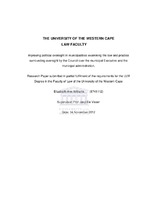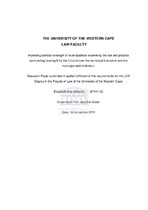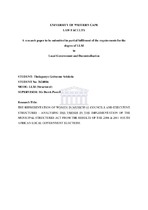| dc.contributor.advisor | Williams, John James | |
| dc.contributor.author | Diutlwileng, Bridgette Akanyang | |
| dc.date.accessioned | 2023-06-12T13:34:42Z | |
| dc.date.available | 2023-06-12T13:34:42Z | |
| dc.date.issued | 2009 | |
| dc.identifier.uri | http://hdl.handle.net/11394/10153 | |
| dc.description | Masters in Public Administration - MPA | en_US |
| dc.description.abstract | This research paper explores the concept and practice of intergovernmental fiscal relations in South Africa, with particular reference to capacity building toward assisting municipalities and improving their readiness to implement the Municipal Finance Management Act (MFMA) 1 • The main purpose of the research project is to investigate the readiness of South African Local Government structures in implementing the Municipal Finance Management Act (MFMA), to evaluate successes and challenges so far, as well as to sketch a way forward with regard to the further capacitation of municipalities in order to assist them to implement the MFMA successfully in the medium to long term. The study employs both qualitative and quantitative methods of data collection, including secondary sources, which comprise government (departmental) reports and policy documents, National Treasury MFMA circulars, as well as library books and journal articles. The primary sources used are survey questionnaires from municipal managers and interviews with officials of the National Treasury, North West Provincial Treasury, and the Department of Local Government and Housing. The envisaged benefits of the study are to provide a better understanding and awareness of the intergovernmental fiscal relations system in South Africa; explore ways of increasing capacity at all levels of local government, thereby coming up with proposals of ensuring broad and effective participatory decision-making and implementation at local government level; provide input into the expenditure responsibilities and revenue authority of Provincial and Local Governments, as well as the design of various forms of national to sub-national transfers; raising awareness among decision-makers regarding the stakes involved as far as the subject is concerned; and finally recommending ways of ensuring that municipalities are sufficiently capacitated to implement financial policy, and thus enhance financial accountability at local government level. The study concludes that government has done a lot to enable municipalities to implement the MFMA, but municipalities have indicated that they need continuous training and other interventions. There are several capacitation programmes, including training and workshops that municipalities have found useful in this regard. Municipalities have indicated that the MFMA is a necessary piece of legislation, and even
those that have indicated that they are not well-capacitated to implement it are of the opinion that government should continue with its implementation because of its importance, but also that there needs to be continuous interventions and re-training for them to be able to implement it successfully in the medium to long term. | en_US |
| dc.language.iso | en | en_US |
| dc.publisher | University of the Western Cape | en_US |
| dc.subject | Capacity Build | en_US |
| dc.subject | Cooperative Government | en_US |
| dc.subject | Fiscal Decentralisation | en_US |
| dc.subject | Intergovernmental Relations | en_US |
| dc.subject | Intergovernmental Fiscal Relations. | en_US |
| dc.subject | Municipal Council | en_US |
| dc.subject | Municipal Finance | en_US |
| dc.subject | Municipal Finance Management Act | en_US |
| dc.subject | Municipal Training | en_US |
| dc.subject | Public Finance Management Act. | en_US |
| dc.title | The readiness of municipalities in implementing the Municipal Finance Management Act. no. 56 of 2003 (MFMA) | en_US |
| dc.rights.holder | University of the Western Cape | en_US |




